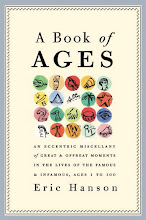Today is the birthday of John O'Hara. Nobody had more stories published in the New Yorker magazine, and no one was better at describing 20th century American life.
He was born in 1905, the son of a Pottsville, Pennsylvania physician. When he was twelve years-old his father offered to pay him $10,000 if he would agree to become a doctor. The boy refused. Instead, when he was 14, he stole his father's Buick. This harum-scarum tendency lasted him all his life. He possessed a devout wish for approval but he was as likely to throw the approval directly back in someone's face. He was social, but volatile, a swell friend but sensitive to slights and prone to grudges. Everybody in New York literary circles had their own O'Hara story. His drunken behavior, his kindnesses, his feuds, his sulks and bragging.
This alternately harsh and tender personality finds vivid expression in his stories. They may be the best picture we have about being alive in America at mid-century. What makes his writing so compelling is the transparency of the style. He is unfussy. Less blunt and mannered than Hemingway. Not elaborate like Faulkner, but detailed in his descriptions of place and time and relationships. Unlike Cheever or Fitzgerald, his sentences don't interpose a lovely style between the reader and the material described. The conversations sound spoken. It is all simply there and happening before you. His novels (except for Appointment in Samarra) tend to be baggy and undistinguished, but his stories deserve a much larger audience. John O'Hara appears five times in A Book of Ages. In 1970, the year he died, he was living in Princeton, New Jersey. He dressed in gentleman's tweeds and drove a Rolls Royce. It was also in this last year that he finally learned to swim. He was 65.
It's also the birthday of Norman Mailer, another writer with a chip on his shoulder, a product of New Jersey and Brooklyn, born in 1923. He wrote his first story when he was ten; it was 35,000 words long. He fought in the Pacific during World War II, and described the experience in his novel The Naked and the Dead. At the age of 44 he was arrested for participating in a march on the Pentagon, protesting the war in Vietnam. He wrote another book about that; The Armies of the Night won the Pulitzer Prize. Norman Mailer appears eight times in A Book of Ages.
Sunday, January 31, 2010
Subscribe to:
Post Comments (Atom)





No comments:
Post a Comment